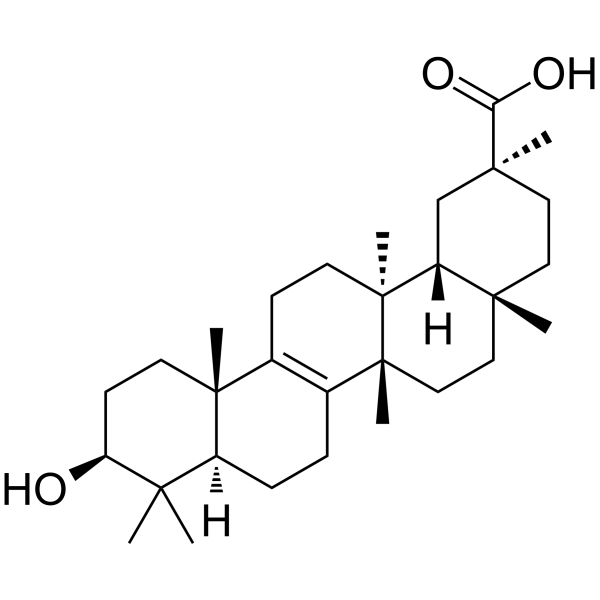Bryonolic acid |
| Catalog No.GC62878 |
Bryonolic acid is an active triterpenoid compound with immunomodulatory, anti-inflammatory, antioxidant and anticancer activities.
Products are for research use only. Not for human use. We do not sell to patients.

Cas No.: 24480-45-3
Sample solution is provided at 25 µL, 10mM.
Bryonolic acid is an active triterpenoid compound with immunomodulatory, anti-inflammatory, antioxidant and anticancer activities[1][2][3].
Bryonolic acid exerts anti-allergic activity by inhibiting homologous passive cutaneous anaphylaxis and delayed hypersensitivity. Bryonolic acid reduces nitric oxide by suppressing inducible nitric oxide synthase expression, indicating anti-inflammatory activity[1]. In rat adrenal pheochromocytoma (PC12) cells, Bryonolic acid against N-methyl-D-aspartate (NMDA)-induced neurotoxicity, indicating it as a candidate neuroprotective agent for cerebral ischemic treatment[1]. Bryonolic acid (1-200 μM) inhibits acyl-coA: cholesterol acyl transferase (ACAT) activity in rat liver microsomes in a concentration-dependent manner, blocking the biosynthesis of the cholesterol fatty acid ester tumour promoter. Bryonolic acid inhibits ACAT in intact cancer cells with an IC50 of 12.6 µM[2]. Bryonolic acid inhibits both clonogenicity and invasiveness in MCF-7 MB-231, U87 and 3T3-EA cells[2].
Bryonolic acid (500 mg/kg; i.p.; once) potently induces HO-1 in a manner dependent on the Nrf2-Keap1 pathway[3].
[1]. Pornpatsorn Lertphadungkit, et al. Enhanced Production of Bryonolic Acid in Trichosanthes cucumerina L. (Thai Cultivar) Cell Cultures by Elicitors and Their Biological Activities. Plants (Basel). 2020 Jun 2;9(6):709.
[2]. Farid Khallouki, et al. Bryonolic Acid Blocks Cancer Cell Clonogenicity and Invasiveness through the Inhibition of Fatty Acid: Cholesteryl Ester Formation. Biomedicines. 2018 Feb 12;6(1):21.
[3]. Tonibelle N Gatbonton-Schwager , et al. Bryonolic acid transcriptional control of anti-inflammatory and antioxidant genes in macrophages in vitro and in vivo. J Nat Prod. 2012 Apr 27;75(4):591-8.
Average Rating: 5 (Based on Reviews and 18 reference(s) in Google Scholar.)
GLPBIO products are for RESEARCH USE ONLY. Please make sure your review or question is research based.
Required fields are marked with *




















